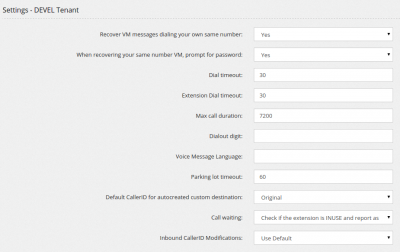Settings
Every tenant can have its own settings. The settings page is divided in sections.

Recover VM messages dialing your own same number. Dialing your own same number is not really useful, so why don't assign this action to recover the VM messages?
When recovering your same number VM, prompt for password permits to skip requesting the voicemail password.
Dial timeout identifies the standard time the dialing command will ring an external number or resource before reporting as “No Answer”.
Extension Dial timeout identifies the time the dialing command will ring an extension, so this is the time an extension will ring before going to the “No Answer” destination.
Max call duration sets the maximal time, in second, a call can last connected.
Dialout digit allows you to define a digit to use for dialing out. If not set, all not local numbers are dialed outbound
Voice Message Language lets you specify the default language to use in the Voicemail and all other voice messages.
Parking log timeout specifies how long in second a call can stay parked before returning to the parking extension.
Default CallerID for autocreated custom destinations. This is the callerid to use when the system needs to generate a Custom Destination, like for example when an unconditional transfer is set using a feature code.
Call waiting. Even if call waiting is usually set on the phone, rejecting or allowing the receiving of a call while online with another call, you can enforce also from the server, reporting busy an extension in use.
Inbound CallerID Modifications sets the CallerID modification to apply to all inbound calls.